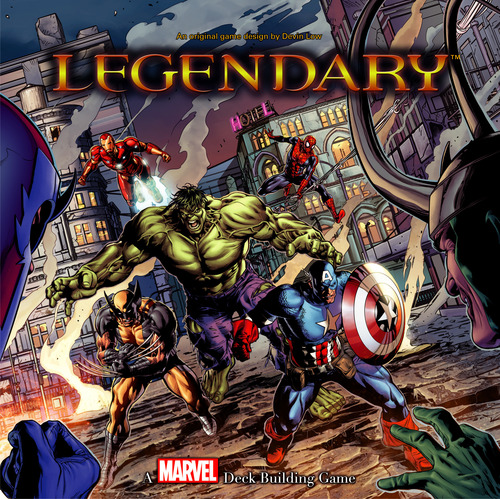This is a first for 24 Panels, but since I've been getting more into board games lately I thought I might as well review a few for the blog! The subject of my review today is, in my opinion, one of the coolest things that Marvel has licensed their characters for in some time (other than the films, of course). I'm talking about Legendary, a deck-building game featuring Marvel superheroes designed by Devin Low and released by Upper Deck. Click for the full review...
 |
| Box art for Legendary. |
As noted above, Legendary is a deck-building game, which means that it has similar gameplay mechanics to other popular games like Dominion and Ascension. The major difference between games like this and something like Magic: The Gathering is that when you buy Legendary, every card there is comes in the box. There's nothing more to buy until they release some (optional) expansions, and even then, your game is complete. (Sidebar: I remember when I was a kid and my friends got into Magic how frustrating it was that I couldn't compete with them without blowing every cent I had on buying better cards. I didn't like the game enough to put much money into it, so I gave it up pretty quickly.)
The way deck-building games work is that there's a central pool of cards available for purchase at any given time, which are replenished from the deck as players acquire them. Each player starts with a relatively weak deck, which they use to acquire better, stronger cards as the game progresses. After acquiring cards, they go in your discard pile and ultimately get shuffled into your deck, where you get to use them to acquire more cards and fight villain cards. What separates this from the other deck-builders I mentioned earlier is that this one is co-operative (you wouldn't want superheroes fighting each other, would you?). At the beginning of the game, you'll get to choose which heroes you want in your hero deck, which mastermind you want to fight, and which villainous scheme you're trying to dismantle. Every player builds their deck from the pool of hero cards, and you're all working together to fight the game... but the game fights back. Villain cards emerge at the beginning of each turn, some of which will have immediate (ambush) effects, while others hurt or help you after you defeat them on your turn. Each scheme lets you play out a different narrative from Marvel lore (e.g. Earth's leaders replaced by Killbots, Superhero Civil War, etc.) and has unique play mechanics and victory conditions. You're all working together, but you can still tally up your victory points after all is said and done to determine who played the best.
The strategy, fun, and replay value comes from the variety of combinations that are possible between all of the different decks. Some heroes will work really well together, while others just don't have any chemistry. There are really a lot of cards in this box (560!), and it'll take you a whole lot of hours to use them all. There are only four masterminds included in the base game (in increasing order of difficulty: Red Skull, Magneto, Dr. Doom, and Loki) but there are many more villain groups and henchman groups, which provide greater variety both on a turn-by-turn basis and from game to game. Best of all, they included a lot of superheroes, though they chose the roster predictably. We've got Avengers (Black Widow, Captain America, Hawkeye, Hulk, Iron Man, Nick Fury, Thor), X-Men (Cyclops, Emma Frost, Gambit, Rogue, Storm, Wolverine) and some lone wolves (Deadpool, Spider-Man). Each hero has its own deck that has different powers that are both unique and character-appropriate. (One of the most fun things about these kinds of games is seeing how the creators twist the characters' superpowers into card-related actions. Well, for me, anyway.)
The game comes with a really large board to play on, which I appreciate as it keeps the cards nicely organized during gameplay. Without a lazy susan, though, it might be difficult to play with friends around a table. Since I'm mostly playing by myself, I particularly appreciate that there are modified rules for solo play built into the game, unlike Dominion or Ascension. Games typically take between 30 and 45 minutes, and it flies by. My biggest complaint is that there's a lot of set-up time, and getting all of the decks back into individual piles takes a few minutes after the game is over as well. I guess I'm used to playing Ascension on my iPad, so I've been spoiled until now. Let's just say that my card-shuffling skills have improved exponentially since getting Legendary!
 |
| Box art for the upcoming Dark City expansion. |
Upper Deck has already announced that they're planning a pretty aggressive expansion strategy for Legendary to keep us playing (and sending our money their way). June 2013 will see the release of Dark City, which will feature 350 new cards. New heroes will concentrate on the X-Force and Marvel Knights groups, and confirmed heroes include Cable, Colossus, Daredevil, Ghost Rider, and Jean Grey (plus 12 others: no word on Moon Knight's inclusion at this time). They'll be up against new masterminds including Kingpin and Apocalypse (plus 3 others), and there will be lots of new schemes, villain groups, and henchmen groups as well. I read online that a smaller, Fantastic Four-specific expansion will come later in the year as well, and that will give you the opportunity to take down Galactus. Exciting, nerdy times ahead.

No comments:
Post a Comment